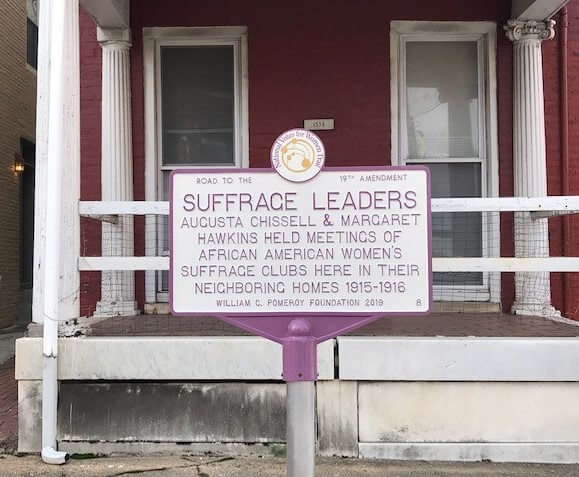SUFFRAGE LEADERS
- Program
- Subject
- Location
- Lat/Long
- Grant Recipient
-
National Votes for Women Trail
-
People
- 1532 Druid Hill Ave, Baltimore, MD 21217, USA
- 39.304084, -76.631563
-
National Collaborative for Women's History Sites
SUFFRAGE LEADERS
Inscription
SUFFRAGE LEADERSAUGUSTA CHISSELL & MARGARET
HAWKINS HELD MEETINGS OF
AFRICAN AMERICAN WOMEN’S
SUFFRAGE CLUBS HERE IN THEIR
NEIGHBORING HOMES 1915-1916
WILLIAM G. POMEROY FOUNDATION 2019
Druid Hill Avenue lies within the northwestern section of Baltimore, Maryland. A group of homes along this storied avenue served as meeting places for the DuBois Circle and other notable African American women’s suffrage clubs.
The ratification of the 15th amendment in 1870, granting African American males the right to vote, lead to mixed feelings within the Women’s Movement. Deeply divided by class, race and ethnicity, some in the Movement felt betrayed. Many Caucasian feminists felt they should have received the right to vote before African American men. Conversely, African American women were hopeful after the 15th amendment was passed that they too would be granted suffrage soon.
The article, “The DuBois Circle and the Suffrage Movement,” by Ida Jones, was published in the winter 2018 edition of Baltimore Gaslight, by the Baltimore City Historical Society. In it, Jones describes how African American women began to form organizations “within churches, social circles and benevolent organizations,” all with the shared goal, “to advance the cause of the race through the betterment of family, home and community.” The article further states that following a 1905 conference of African American leaders in Niagara Falls (known as the Niagara Movement), the Baltimore Niagara Movement branch was formed. The Niagara Movement would later come to be known as the National Association for the Advancement of Colored People (NAACP). A group of well-connected African American women in Baltimore chose to form an auxiliary to this branch in 1906, called the DuBois Circle.
Members of this activist group included Margaret Gregory Hawkins and Augusta T. Chissell. Hawkins served as the first president of the group, from 1906 to 1913 (Minutes DuBois Circle 1b, DuBois Circle Archives, 7 May 1907). Hawkins often hosted monthly meetings at her home on 1532 Druid Hill Avenue, as did Chissell, who lived next door at 1534 Druid Hill Avenue (DuBois Circle Program/Calendar, DuBois Circle Archives, 1914-1918). According to meeting minutes, discussions weren’t limited to suffrage, but also explored ways to improve the lives of African Americans in their community (DuBois Circle Archives, 21 May 1907). Each month they would examine a conscientious topic or bring in a guest speaker to discuss relevant issues concerning African Americans throughout the world (DuBois Circle Program/Calendar).
In 1920, the 19th amendment was ratified and women were granted the right to vote. With this newfound privilege came many questions surrounding what this actually meant. To address this uncertainty, Augusta T. Chissell created a column in the Baltimore Afro-American, called “A Primer For Women Voters,” where she would reply to readers’ concerns. In the October 16, 1920 issue, one woman asked, “What good will it do women to vote?” In reply, Chissell wrote, “It will give women power to protect themselves in their persons, property, children, occupation, opportunities and social relations. It will enable them to get done what ought to be done…so it will make all classes of women more nearly equal with men and with each other.”
The DuBois Circle was just one organization of African American women that met in the vicinity of Druid Hill Avenue of Baltimore. The Progressive Suffrage Club and Woman’s Co-operative Civic League were several others known for meeting at the Hawkins’ residence (Baltimore Afro-American, 20 Jan 1917 and 6 Jan 1917). For the next few decades, Chissell and Hawkins would continue to fight for their right to vote. Even though it was now a legal right, most African Americans were prevented from voting due to racial discrimination.
As of 2019, the DuBois Circle was still active. At over one hundred years old, many believe it may be one of the oldest, surviving African American women’s organizations in Baltimore.

